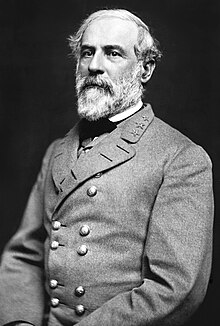Robert E Lee
|
General Robert E. Lee |
|
|---|---|

Julian Vannerson's photograph of Robert E. Lee in March 1864
|
|
| Birth name | Robert Edward Lee |
| Nickname(s) | Bobby Lee, Uncle Robert, Marse Robert, Granny Lee, the King of Spades, the Old Man, the Marble Man |
| Born |
January 19, 1807 Stratford Hall, Virginia, U.S. |
| Died | October 12, 1870 (aged 63) Lexington, Virginia, U.S. |
| Buried | Lee Chapel Washington and Lee University Lexington, Virginia |
| Allegiance | United States of America Confederate States of America Commonwealth of Virginia |
| Service/branch |
United States Army Confederate States Army |
| Years of service | 1829–1861 (USA) 1861–1865 (CSA) |
| Rank |
Colonel (U.S. Army) General (C.S. Army) |
| Commands held |
U.S. Military Academy Army of Northern Virginia General-in-Chief, CSA |
| Battles/wars |
Mexican–American War Harpers Ferry Raid American Civil War |
| Spouse(s) | Mary Anna Randolph Custis |
| Relations | Henry "Light Horse Harry" Lee III (father) |
| Other work | President of Washington and Lee University |
| Signature | |
|
|
Robert Edward Lee (January 19, 1807 – October 12, 1870) was an American general known for commanding the Confederate Army of Northern Virginia in the American Civil War from 1862 until his surrender in 1865. A son of Revolutionary War officer Henry "Light Horse Harry" Lee III, Lee was a top graduate of the United States Military Academy and an exceptional officer and military engineer in the United States Army for 32 years. During this time, he served throughout the United States, distinguished himself during the Mexican–American War, and served as Superintendent of the United States Military Academy.
When Virginia declared its secession from the Union in April 1861, Lee chose to follow his home state, despite his desire for the country to remain intact and an offer of a senior Union command. During the first year of the Civil War, Lee served as a senior military adviser to President Jefferson Davis. Once he took command of the main field army in 1862 he soon emerged as a shrewd tactician and battlefield commander, winning most of his battles, all against far superior Union armies. Lee's strategic foresight was more questionable, and both of his major offensives into Union territory ended in defeat. Lee's aggressive tactics, which resulted in high casualties at a time when the Confederacy had a shortage of manpower, have come under criticism in recent years. Lee surrendered his entire army to Ulysses S. Grant at Appomattox Court House on April 9, 1865. By this time, Lee had assumed supreme command of the remaining Southern armies; other Confederate forces swiftly capitulated after his surrender. Lee rejected the proposal of a sustained insurgency against the Union and called for reconciliation between the two sides.
...
Wikipedia
